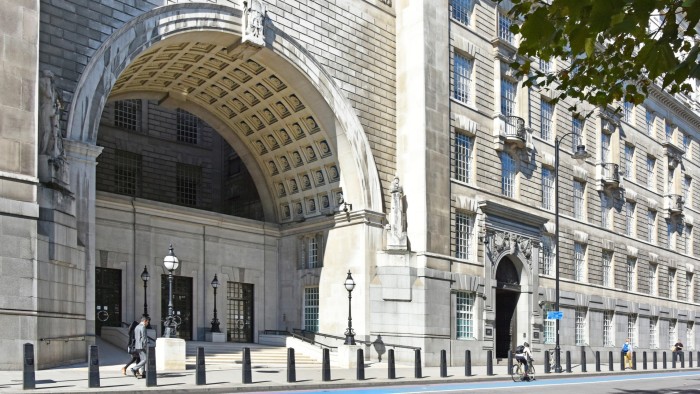Unlock the Editor’s Digest for free
Roula Khalaf, Editor of the FT, selects her favourite stories in this weekly newsletter.
Senior judges held out the prospect of holding MI5 officers in contempt as they ordered an independent investigation into how the UK security service misled the courts about an agent accused of abusing women.
The High Court on Wednesday said the domestic intelligence agency provided “false evidence” in legal proceedings involving the BBC and a MI5 agent accused of abusing two female partners.
Previous reviews of the episode — one conducted by MI5 itself, another commissioned by its director-general and the home secretary — concluded there was “no deliberate attempt” by its staff to mislead the courts.
But a panel of top judges on Wednesday said both probes were “procedurally deficient and we cannot rely on their conclusions”.
The judges — led by lady chief justice Baroness Sue Carr — will take a decision at a later date on whether to bring contempt of court proceedings against individuals at MI5.
Given the shortcomings with the previous probes, “we consider that it would be premature to reach any conclusions on whether to initiate contempt proceedings against any individual,” the judges said.
They ordered a “robust” investigation under the auspices of Sir Brian Leveson, the Investigatory Powers Commissioner who has oversight of MI5’s surveillance activities.
The case concerns the activities of a covert human intelligence source — a “CHIS”, or agent — for MI5, known as X. The BBC alleged he was a dangerous extremist and misogynist who abused two female partners.
The UK government in 2022 secured an injunction to prevent the BBC from identifying X.
But the broadcaster was able to report that X attacked one of the women, known as Beth, with a machete, and that he terrorised her by telling her he worked for MI5.
During the injunction proceedings, a senior MI5 officer known as Witness A told the court that it had not confirmed or denied to the BBC whether the individual accused of attacking his girlfriend was one of its agents.
UK security agencies routinely follow a policy of neither confirming nor denying (NCND) informants’ identities.
However, the BBC insisted that MI5 had in fact disclosed his status as a CHIS to one of its journalists.
The evidence provided to the court was later admitted by MI5 and the attorney-general to have been false. Sir Ken McCallum, the security service’s director-general, issued an apology in February.
In a ruling on Wednesday, the judges said the incorrect evidence had misled the High Court in the BBC injunction proceedings, as well as in a separate but related human rights claim brought by Beth.
“Special advocates”, who were appointed to represent the BBC’s interests in “closed” proceedings — held behind closed doors on national security grounds — were also misled, the High Court found.
Carr, alongside Dame Victoria Sharp, president of the King’s Bench Division, and Mr Justice Chamberlain, criticised MI5’s decision to maintain its “NCND” policy “long after it was unrealistic to do so”.
MI5 commissioned internal and external investigations to understand how false evidence came to have been presented in court. The investigations concluded that there was no attempt by MI5 to mislead the courts, but that mistakes were made.
“It is regrettable that MI5’s explanations to this court were given in a piecemeal and unsatisfactory way,” the judges said. “It is to be hoped that events such as these will never be repeated.”
McCallum said in a statement: “I wish to repeat my full and unreserved apology for the errors made in these proceedings.”
“We take our duty to provide truthful, accurate and complete information with the utmost seriousness. Resolving this matter to the court’s satisfaction is of the highest priority for MI5.”
He added that MI5 was seeking to “learn all lessons and implement changes to ensure this does not happen again”.




